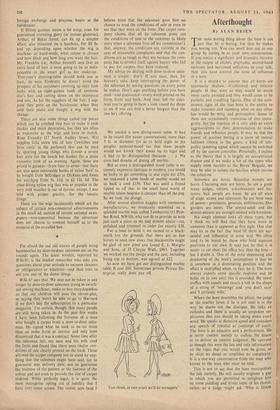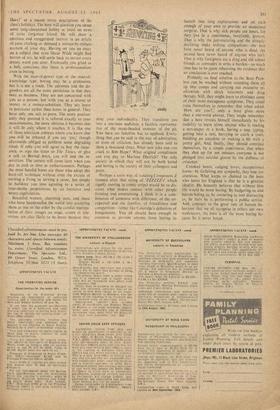Afterthought
By ALAN BRIEN
Men most boring thing about the bore is not I just that he is boring, but that he makes you boring too. You can smell him out in any
group by tuning in to your own conversation.
If you notice a significant and dramatic increase in the output of clichés, platitudes, second-hand opinions and borrowed anecdotes in your talk, then you have entered the zone of influence of a bore.
It is a Mistake to assume that all bores are necessarily shallow, ill-informed and inferior people. If that were so they would be much
more easily avoided and they would cease to be pathetic and troubling figures. One of the com- monest signs of the true bore is the ability to make tiresome and numbing what on any other
lips would be witty and provocative. Some of them are occasionally conscious of this incon- gruity, but the injustice of it only adds an extra aggressiveness to their determination to make friends and influence people. It may be that the power of positive boring is a form of mental halitosis inborn in the genes, a kind of tele- pathic jamming signal which cannot be switched off by the station controller. Personally, I incline to the theory that it is largely an occupational disease and if we make a list of the types who supply most recruits to the Bores' Brigade, we may be. able to isolate the bacillus which carries the infection.
Salesmen are bores. Beautiful women are bores. Charming men are bores. So are a great many judges, editors, schoolmasters and lec- turers. Sick people are bores. So are all stars of stage, screen and television. So are most men of power—presidents, generals, millionaires. Do- gooders are bores. The almost-adult and the almost-ancient are strongly tainted with boredom.
No single element links all these types, but I think we will find that they have more in common than is apparent at first sight. One clue may lie in the fact that most of them are suc- cessful and influential in some way. We often tend to be bored by those who hold superior positions to our own. It may just be that it is easier to cut short the office boy than the boss— but I doubt it. One of the most depressing and deadening of the bore's assumptions is that he is somehow in a dominating position and the effect is multiplied when, in fact, he is. The bore always expects some specific response and he holds on to you until this is provided. He never traffics with equals and exacts a toll in the shape of a string of 'amazings' and 'you don't says' and 'I certainly wills.'
Where the bore resembles the editor, the judge or the teacher (even if he is not one) is in the way he shares out the dialogue. He talks ex cathedra and there is usually an unspoken im- plication that you should be taking down every word. He speaks at dictation speed and considers any speech of rebuttal as contempt of court. The bore is an educator and a perfectionist. He is never content merely to outline the lesson or to deliver an interim judgment. He' operates as though this were the last and only information on the topic that you would ever be given, so he skips no detail or simplifies no complexity. It is a one-way conversation from the man who knows to the man who must be told.
This is not to say that the bore monopolises the talk entirely. He will usually engineer a gap in which you are permitted to enlighten him on some piddling and trivial topic of his choice, rather as a judge might ask 'Who is Diana Dors?' or a master invite descriptions of the class's holidays. The borc will question you about some long-abandoned hobby or insist on news of some 'forgotten friend. He will show a spurious and exaggerated interest in an article of. your clothing or demand a minute-by-minute, account of your day. Having set you an essay on a subject that even Oscar Wilde might find barren of wit, he will settle back to savour every dreary word you utter. Eventually you grind to a halt, conscious that there is professionalism even in boring.
With the man-of-power type or the man-of- knowledge type, boring may be a profession, but it is not a trade. The salesmen and the do- gooders are all the more pernicious in that they bore as business. They are not concerned with you as a person, but with you as a source of money or a money-substitute. They are bores in particular rather than bores in general. They have only one suit to press. The more passion- ately they pretend it is tailored exactly to your
• measurements, the more obvious it becomes that it will lit only where it touches. It is like one of those television contests where you know that you Will be released if you say 'yes,' though afterwards obliged to perform some degrading ritual. If only you will agree to buy the insur- ance, or sign the letter to The Times, or give a talk to Borstal boys, you will end the in- quisition. The torture will come later when you pay in cash or time or embarrassment. Perhaps the most hateful bores are those who adopt this hard-sell technique without even the excuse of earning a living or serving a cause, but simply to bulldoze you into agreeing to a series of improbable propositions by an insincere and weary capitulation.
Beautiful women, charming men, and those who have bamboorted the world into accepting • them as one or the other by the careful manipu- lation of their images on stage, screen or tele- vision, are also likely to be bores because they deny . your individuality. They transform you into a one-man audience, a faceless representa- tive of the many-headed monster of the pit. You have no function but to -applaud. Every- thing that can be said in the way of admiration, or even of criticism, has already been said to them a thousand times. What new joke can you crack to Bob Hope? What original compliment can you pity to Marlene Dietrich? The only society in which they will not be both bored and boring is the society of their colleagues and . peers.
Perhaps a surer way of isolating Component Z (named after that string of 'ZZZZZZ's' which signify snoring in comic strips) would be to dis- cover what makes contact with other people livening and entertaining. I think it is a com- bination of sameness with difference, of the un- expected and the familiar, of friendliness and competition—rather like Coleridge's definition of Imagination. You all should have enough in common to prevent anyone from haying to launch into. Jong explanations and yet each enough of your • own to provide an occasional surprise. That is .why sick people are bores. for they live in a continuous, invariable, present. That is why the just-maturing and the already- declining make tedious companions—the first have never heard of anyone who is dead, the second have never 'heard of anyone who isn't. That is why foreigners are a drag and old school friends or comrades in arms a burden—so much time has to be spent rehearsing the evidence that no conclusion is ever reached.
Probably no final solution to the Bore Prob- lem can, be reached without rounding them all tip into camps and carrying out extensive re- education. with shock treatment and drug therapy. Still, they might learn to eliminate some of their more outrageous symptoms. They could train themselves to remember that when asked. 'How are you'?,' only , a bore gives more than a one-word answer. They might remember that a bore reveals himself immediately by his inability to leave alone anyone who is reading a newspaper or a book, having a nap, typing, getting into a taxi, hurrying to catch a train, finishing an anecdote or making a hit with a pretty girl. And, finally, they should convince themselves, by a simple experiment, that when they shut up for ten minutes everyone is not plunged into suicidal gloom by the dullness of • existence.
Crooked bores, cadging bores, occupational bores—by forfeiting our sympathy, they lose our attention. What keeps us chained to the bore who bores for England is that he is a genuine idealist. He honestly believes that without him life would be more boring. By badgering us and button-holing us, by cornering us and distracting us, he feels he is performing a public service. And, contrary to the great rule of human be- haviour that we all recognise in others our own weaknesses, the bore is all the more boring be- cause he is never bored.































 Previous page
Previous page